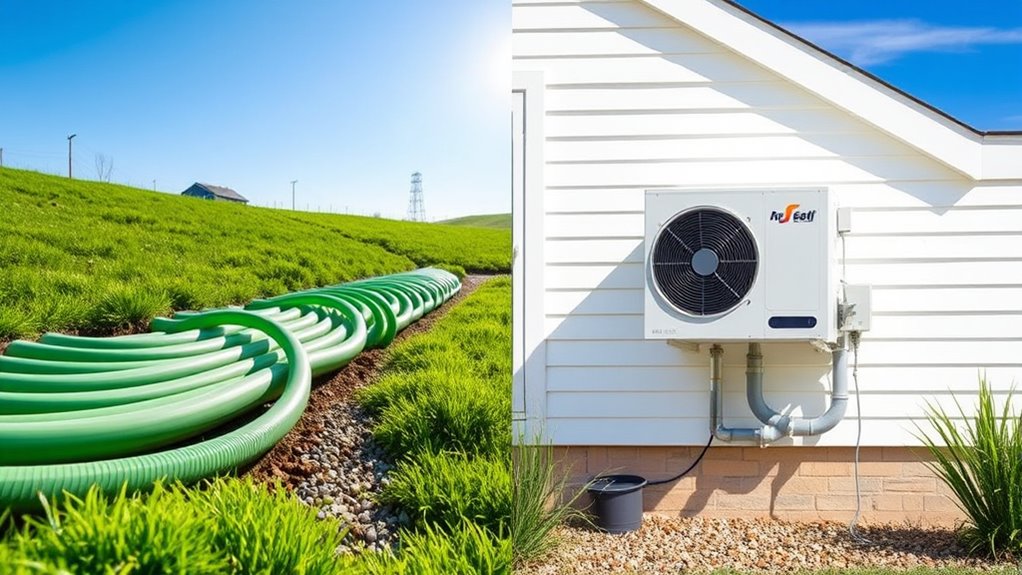If you’re choosing between geothermal and air-source heat pumps, consider your climate, land availability, and budget. Geothermal systems use underground loops, offering higher efficiency and lower maintenance, ideal for variable climates but with higher upfront costs. Air-source units are easier to install and suited for milder weather, though they may struggle in extreme cold. To find out which system best fits your needs and how each performs, explore further details below.
Key Takeaways
- Geothermal heat pumps use underground loops for consistent temperatures, offering higher efficiency than air-source systems that rely on outside air.
- Installation costs are higher for geothermal due to ground loop setup, while air-source units are simpler and cheaper to install.
- Geothermal systems operate effectively in extreme weather, whereas air-source heat pumps may struggle in very cold conditions.
- Geothermal units typically have a longer lifespan and lower maintenance needs compared to outdoor air-source units.
- Air-source heat pumps are more suitable for limited land or quick installations, while geothermal is ideal where land is available for ground loops.

Are heat pumps the right choice for your home? If you’re considering a heating and cooling system that’s energy-efficient and environmentally friendly, it’s worth exploring the differences between geothermal and air-source heat pumps. Both rely on the refrigerant cycle, but they do so in different ways, which impacts their efficiency, installation costs, and suitability for your climate. With a geothermal heat pump, the key component is the ground loop—an underground piping system that taps into the stable temperatures beneath the surface. This ground loop circulates fluid, absorbing heat from the earth in winter and releasing heat back into it during summer. Because underground temperatures remain relatively constant year-round, geothermal systems tend to operate more efficiently, providing consistent heating and cooling even during extreme weather. Additionally, geothermal systems often have lower maintenance requirements due to their durable underground components.
Geothermal heat pumps use underground loops for efficient, consistent heating and cooling year-round.
In contrast, air-source heat pumps draw heat directly from the outside air. They’re generally simpler to install because they don’t require extensive excavation for a ground loop. Instead, they use outdoor units equipped with coils that exchange heat with the air, and inside units that distribute conditioned air throughout your home. While modern air-source models have improved considerably in cold climates, their efficiency can decline when outdoor temperatures plummet, making them less reliable in areas with harsh winters. To compensate, some air-source systems incorporate advanced refrigerant cycles and backup heating elements, but they still tend to have higher operating costs during very cold months compared to geothermal systems.
Choosing between the two comes down to your specific circumstances. Geothermal systems have higher upfront costs because of the installation of the ground loop and associated equipment, but they often pay off in lower energy bills over time thanks to their efficiency. They also tend to last longer, with underground components that can operate effectively for decades. On the other hand, air-source heat pumps are less expensive to install and can be a practical choice if your climate isn’t too cold or if you want a quicker, less invasive setup. They’re ideal for milder regions and for homeowners who want a reliable, low-maintenance system. Understanding the installation process and how each system interacts with the environment helps in making an informed decision.
Ultimately, your decision should consider your local climate, available land for installation, and budget. Both geothermal and air-source heat pumps leverage the refrigerant cycle to transfer heat efficiently, but their different methods of capturing and releasing heat influence their performance and longevity. If you prioritize energy savings and durability in a variable climate, geothermal could be the better option. For easier installation and lower initial costs, an air-source heat pump might be more suitable. Either way, understanding how each system works helps you make an informed choice that aligns with your home’s needs.
Frequently Asked Questions
How Do Geothermal and Air-Source Heat Pumps Perform in Extremely Cold Climates?
In extremely cold climates, geothermal heat pumps outperform air-source units because of their frost resistance and stable underground temperatures. You’ll find geothermal systems require less insulation and maintenance, as the ground keeps the system functioning efficiently even in freezing weather. Air-source heat pumps may struggle with frost buildup, reducing efficiency. So, if you’re in a harsh climate, geothermal options offer more reliable heating performance year-round.
What Are the Long-Term Maintenance Requirements for Both Systems?
You’ll find that maintenance frequency for both systems is relatively low, typically needing annual inspections. Geothermal systems are highly durable, with underground loops lasting 25+ years, reducing long-term upkeep. Air-source heat pumps may require more frequent filter changes and coil cleaning, especially in harsh climates. Overall, both systems offer good system durability, but geothermal’s underground components tend to demand less maintenance over time, making them a reliable long-term choice.
How Do Installation Costs Compare Between Geothermal and Air-Source Heat Pumps?
You’ll find that installation costs for geothermal heat pumps are higher upfront due to the need for ground loops or wells, making the initial investment significant. In contrast, air-source heat pumps have lower installation costs because they’re easier to install without extensive ground work. While geothermal systems cost more initially, they often save you money over time through lower energy bills, whereas air-source units are more budget-friendly at the start.
Which System Offers Better Energy Efficiency Over Its Lifespan?
You’ll find geothermal heat pumps generally offer better energy efficiency over their lifespan due to their consistent ground-source temperature, leading to lower energy costs. In an efficiency comparison, they outperform air-source systems, especially in extreme weather. Although the initial cost analysis shows geothermal systems are more expensive to install, their long-term savings in energy bills make them a more efficient choice overall.
Are There Any Environmental Impacts Associated With Each Type of Heat Pump?
Think of these heat pumps as guardians of the environment. Both have minimal environmental footprints, but geothermal systems excel in resource sustainability by tapping into the Earth’s stable underground temperatures, reducing energy consumption. Air-source units may emit more greenhouse gases during operation, especially in extreme weather. Your choice influences the long-term environmental impact, making sustainability a key factor in your decision.
Conclusion
Ultimately, choosing between geothermal and air-source heat pumps depends on your specific needs and budget. Geothermal systems offer efficiency and long-term savings, while air-source units are easier to install and more affordable upfront. Remember, a penny saved is a penny earned—so weigh your options carefully. By understanding both, you can make a smart choice that keeps your home warm and your wallet happy for years to come.









